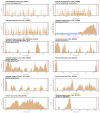Mining Porcine Blood Whole-DNA Sequencing Datasets to Uncover Pig Viromes: An Exploratory Application to Identify Potential Infecting Agents of an Undefined Disease Outbreak
- PMID: 40559750
- PMCID: PMC12197690
- DOI: 10.3390/vetsci12060513
Mining Porcine Blood Whole-DNA Sequencing Datasets to Uncover Pig Viromes: An Exploratory Application to Identify Potential Infecting Agents of an Undefined Disease Outbreak
Abstract
Pigs are affected by a variety of pathogenic agents that need to be identified correctly and diagnosed even when co-infections may complicate the application of specific and targeted assays. Next-generation sequencing can provide new perspective to monitor viruses infecting or co-infecting diseased pigs. In this study, we tested, for the first time for diagnostic purposes in a livestock species, a new method based on whole-genome sequencing of all the DNAs extracted from the blood of nine pigs sampled from a farm where there was a suspected outbreak of Post-weaning Multisystemic Wasting Syndrome. We then used unmapped reads on the porcine reference genome to mine for viral sequences using a specifically designed bioinformatic pipeline. Within this fraction of reads, viral sequences ranged from 0.002% to 4.4% of the total unmapped reads and were derived from twelve different viruses known to infect pigs, where three were herpesviruses, eight were parvoviruses, and one was a circovirus. All pig sequencing datasets were positive for one or more viruses, with various potential viral loads. Suid betaherpesvirus 2, also known as Porcine cytomegalovirus (PCMV), was the most frequently identified virus as five out of the nine pig sequencing datasets contained viral sequences from this virus. The results may suggest a heterogeneous viral profile of the diseased pigs that may be derived from potential secondary infections or co-infections. This pilot application demonstrated that a whole-genome sequencing approach can complement other routine diagnostic assays in veterinary virology. Other studies and improvements are needed to validate the results and apply this approach in routine monitoring applications.
Keywords: Sus scrofa; assay; genomics; next-generation sequencing; pathogen; post-weaning multisystemic wasting syndrome; virus.
Conflict of interest statement
The authors declare no conflicts of interest. The funders had no role in the design of the study; in the collection, analyses, or interpretation of data; in the writing of the manuscript; or in the decision to publish the results.
Figures
Similar articles
-
Signs and symptoms to determine if a patient presenting in primary care or hospital outpatient settings has COVID-19.Cochrane Database Syst Rev. 2022 May 20;5(5):CD013665. doi: 10.1002/14651858.CD013665.pub3. Cochrane Database Syst Rev. 2022. PMID: 35593186 Free PMC article.
-
Cost-effectiveness of using prognostic information to select women with breast cancer for adjuvant systemic therapy.Health Technol Assess. 2006 Sep;10(34):iii-iv, ix-xi, 1-204. doi: 10.3310/hta10340. Health Technol Assess. 2006. PMID: 16959170
-
Rapid, point-of-care antigen tests for diagnosis of SARS-CoV-2 infection.Cochrane Database Syst Rev. 2022 Jul 22;7(7):CD013705. doi: 10.1002/14651858.CD013705.pub3. Cochrane Database Syst Rev. 2022. PMID: 35866452 Free PMC article.
-
Diagnostic test accuracy and cost-effectiveness of tests for codeletion of chromosomal arms 1p and 19q in people with glioma.Cochrane Database Syst Rev. 2022 Mar 2;3(3):CD013387. doi: 10.1002/14651858.CD013387.pub2. Cochrane Database Syst Rev. 2022. PMID: 35233774 Free PMC article.
-
Drugs for preventing postoperative nausea and vomiting in adults after general anaesthesia: a network meta-analysis.Cochrane Database Syst Rev. 2020 Oct 19;10(10):CD012859. doi: 10.1002/14651858.CD012859.pub2. Cochrane Database Syst Rev. 2020. PMID: 33075160 Free PMC article.
References
-
- Yoon K.-J. Overview of Viruses. In: Zimmerman J.J., Karriker L.A., Ramirez A., Schwartz K.J., Stevenson G.W., editors. Diseases of Swine. 10th ed. Wiley-Blackwell; West Sussex, UK: 2012. pp. 383–391.
Grants and funding
- RFO 2024/University of Bologna
- Application of animal genomics and data mining to predict and monitor novel coronavirus poten-tial infections (VirAnimalOne)/European Open Science Cloud (EOSC) Secretariat
- AnGen1H project/EGI call for COVID-19 research projects
- actions 1.1.4 and 1.2.2-Bando per sostenere progetti di ricerca ed innovazione per lo sviluppo di soluzioni finalizzate al contrasto dell'epidemia da COVID-19-Project LIVESTOCK-STOP-COVI/POR FESR Emilia-Romagna 2014-2020
LinkOut - more resources
Full Text Sources


